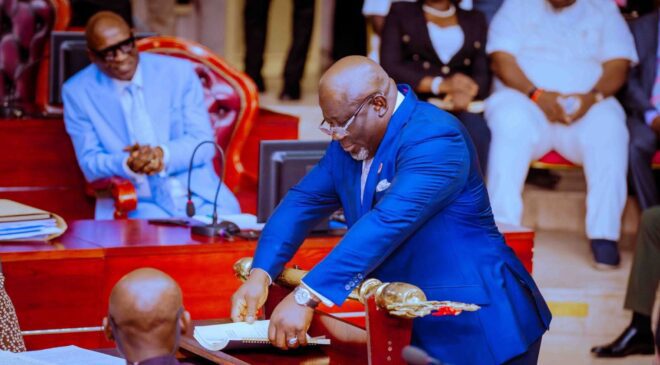
By Emmanuel Enebeli
In what can be described as a defining moment for democratic accountability and good governance in Delta State, Governor Sheriff Oborevwori on May 28, 2025, made history by delivering the state’s first-ever State of the State address before the Delta State House of Assembly. This important civic exercise, long overdue in our democratic journey, provided the Governor a platform to reflect on his administration’s progress under the M.O.R.E Agenda while charting a roadmap for future development. The event was not merely ceremonial—it served as a bold statement of transparency and leadership.
However, while we commend this unprecedented move, it is important to emphasize that this should not be a one-off display of administrative showmanship. Institutionalizing the State of the State address—as done in advanced democracies like the United States where the President delivers an annual State of the Union—is critical for fostering a culture of accountability, policy continuity, and public engagement. Successive administrations in Delta State must adopt this democratic ritual as an obligation, not a choice. Citizens deserve to be consistently updated on the state’s development trajectory by their elected leaders.
Beyond highlighting government milestones, Oborevwori’s address also sent a subtle yet firm challenge to lawmakers: to look beyond their constitutional duties and become champions of development in their constituencies. His call was not just for oversight, but for strategic collaboration. The Governor urged the legislature to serve as engines of grassroots development, aligning their efforts with the executive to accelerate socio-economic transformation across the state.
The Governor’s presentation laid out significant accomplishments. Infrastructure was a dominant theme, with progress on the 46-kilometre dualisation of the Ughelli–Asaba Road (Sectors C1 and C2), construction of the Kwale–Beneku Bridge, and other strategic roads in Effurun, Ekpan, Warri, Sapele, Abraka, and Ughelli. These projects are not only vital for easing movement and boosting the economy—they also reflect a governance philosophy that recognizes the power of infrastructure in connecting people and opportunities.

In healthcare, the administration has rehabilitated hospitals, equipped facilities, and expanded enrollment in the Delta State Contributory Health Insurance Scheme to over two million Deltans. The establishment of the College of Health Technology in Ovrode further underscores the administration’s commitment to building a sustainable health system supported by a competent workforce. These are measurable strides in a sector often neglected by subnational governments.
The education sector has also benefited from targeted interventions, including the employment of over 3,000 teaching and non-teaching staff, as well as the development of new faculty infrastructure at the Nigerian Maritime University. The consistent disbursement of bursaries also signals a deliberate investment in human capital development, which is the foundation of any society’s long-term prosperity.
Social empowerment initiatives featured prominently. With over 266,000 Deltans reached through schemes like the Delta CARES programme, MORE Biz-Up, WESAP, and the Widows Welfare Scheme, the administration has demonstrated a significant commitment to inclusive governance. Particularly commendable is the attention given to vulnerable groups, such as women and persons with disabilities, who often fall through the cracks in public policy implementation.
Agriculture, the bedrock of rural livelihoods and food security, has seen a boost with the release of N1 billion as counterpart funding for AUDA-NEPAD and other input support initiatives. These efforts are timely, considering Nigeria’s current food crisis and inflationary pressures. Strategic investments in food production and agribusiness are essential for stabilizing the economy and reducing unemployment.
The Governor also spotlighted judicial reforms, most notably the commissioning of a modern High Court Complex equipped with IT infrastructure. This advancement promises more efficient legal processes and reinforces the state’s commitment to upholding the rule of law. Effective judicial systems are a cornerstone of democratic societies, and such investments are not just symbolic—they are foundational.
The equitable distribution of capital projects across all 25 local government areas, as disclosed by the Governor, is another highlight. By ensuring that no part of the state is left behind, the administration affirms its commitment to balanced development, equity, and social harmony—principles that are often only given lip service in many state policies.
Governor Oborevwori’s reiteration of his core values—transparency, servant leadership, accountability, innovation, and excellence. was not merely rhetorical. It served as a reaffirmation of purpose, and a commitment to deepen gains made in the past two years. However, rhetoric must always be matched with action, and the citizens of Delta will be watching closely as his administration enters the second half of its mandate.
The Assembly’s unanimous vote of confidence in the Governor is a political endorsement, but it must not translate to complacency. The praise by Rt. Hon. Emomotimi Guwor and others, while valid, must be matched with legislative vigilance. The legislature must continue to serve as a people-centric institution that prioritizes responsive representation and transparent oversight.
As a public analyst and critical observer of governance, it is important to note that this address has set a precedent, one that should be normalized and improved upon. But equally important is the need for Governor Oborevwori to also maintain regular, direct engagements with the media. The media is a vital partner in governance; its role in shaping public perception, amplifying policy impacts, and holding leaders accountable cannot be overstated. Regular press briefings and town hall interactions with journalists would further open up governance and build public trust.
In the final analysis, the Governor’s address was a breath of fresh air in a political climate where opacity is often the norm. Yet, the success of such initiatives will ultimately be measured not just by applause in the chambers, but by the lives improved across Delta State. The State of the State address must become a democratic tradition, a civic compass by which leaders and citizens can chart progress together. Let this not be a fleeting political moment, but the birth of a culture of open governance in Delta State.
Emmanuel Enebeli, Mnipr, CEO, Entrepreneur, Public Relations and Media Strategist: Email: enebelli@hotmail.com, Phone: +234 (806) 331 9057
